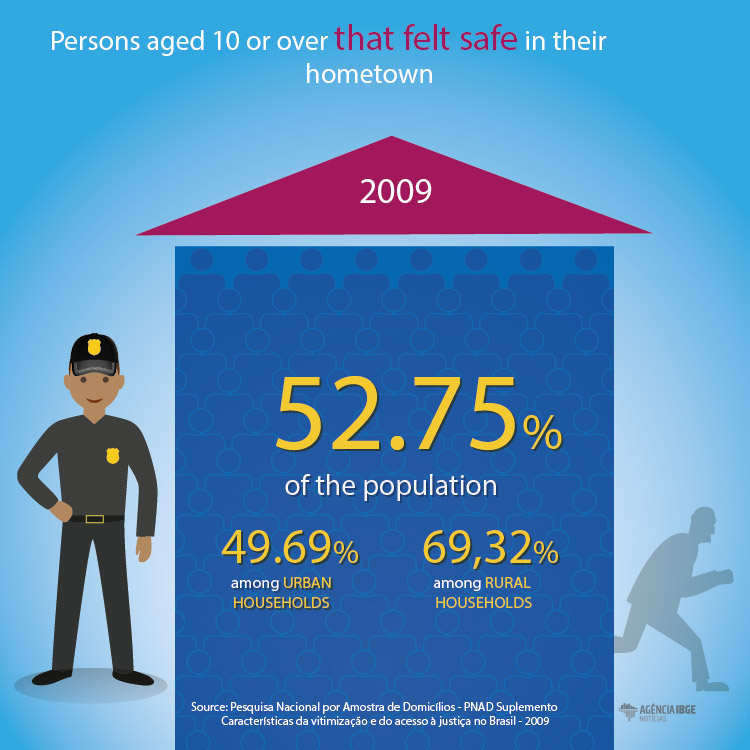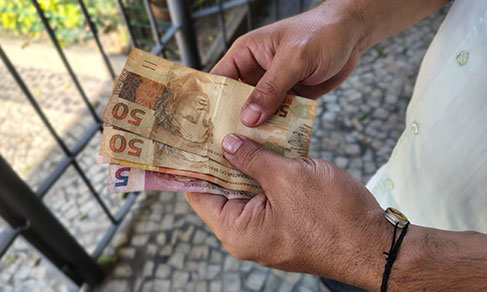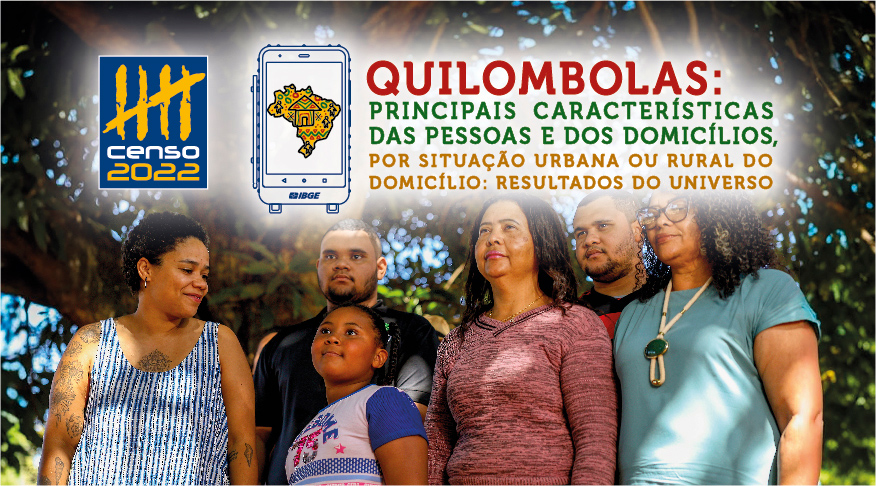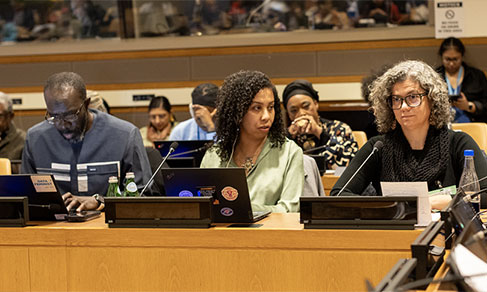Citizen Constitution: 30 years later
Insecurity increases, limits rights and threatens freedom in the country
June 29, 2018 04h50 PM | Last Updated: August 29, 2018 03h59 PM
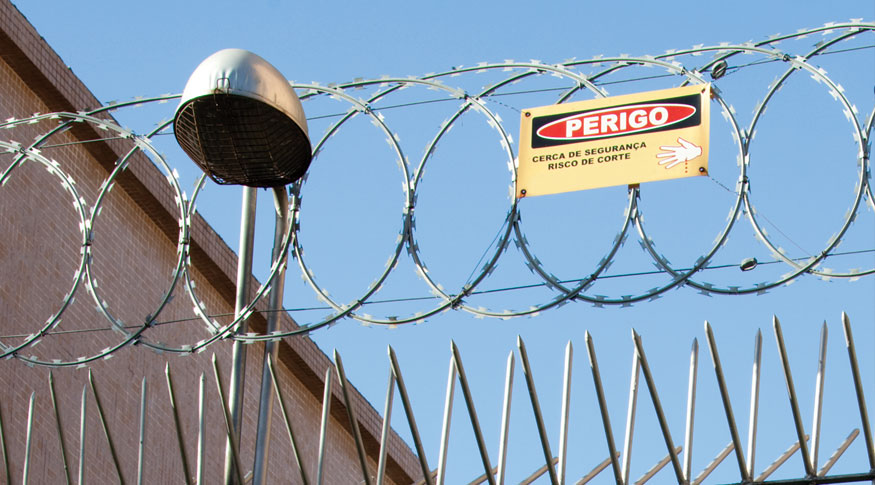
Security, one of the rights guaranteed in the 1988 Federal Constitution, is a fundamental necessity of life in society and the feeling that we lack it can definitely affect everyone's lives, from long-term plans to weekend leisure plans. When the right to life is threatened, leisure - also protected by the Citizen Constitution - becomes a manifestation of resistance amid fear.
Art. 5 All are equal before the law, without distinction of any kind, Brazilians and foreigners residing in the country are ensured the inviolability of the right to life, liberty, equality, security and property [...]
Art. 215 The State shall guarantee to all the full exercise of cultural rights and access to the sources of national culture, and shall support and encourage the promotion and dissemination of cultural expressions.
In general, according to sociologist Ignacio Cano, public security has gone back to what it was 30 years ago, when the Federal Constitution was approved. In addition to crime growth, there has been an increase in the number of places where the state is no longer sovereign, such as areas dominated by militias or drug dealers.
"There has been a deterioration since then. Homicide rates have increasingly grown. There has been a shift from lethal violence as a problem from the Southeast to the Northeast, as well as an increase in the sense of insecurity. We are champions of homicide in the world, which increases this perception of permanent crisis in public security," explained the coordinator of the Laboratory for Violence Analysis of the Rio de Janeiro State University (UERJ).
“Back then, we used to think that re-democratization alone would reduce crime. A part of the left wing did believe that social inclusion – just mitigating inequality – would solve the crime issue, which did not happen. Studies show that this relationship between poverty, inequality and violence is a long-term relationship, i. e., the effects of the recent inequality reduction have not affected the current situation yet,” complemented Cano.
Today, Rio de Janeiro is in the spotlight of the national attention when it comes to public security. Under federal intervention since February this year, the state undergoes a crisis in this area, which has worsened in the last years.
Although the sense of insecurity is normal among the Rio de Janeiro citizens, those who live in areas dominated by criminals are daily threatened by fear. One of the examples is the Complexo da Maré, in the capital, where there used to live 129,7 thousand persons in 2010, according to the Census that year.
“The Maré is divided by invisible barriers separating the areas dominated by different criminal gangs. But in the last years the right to come and go has fallen due to the State, their incursions happen at any time. I’ve seen the State oppression grow inside my favela,” said Flávia Cândido, 36 years old, a resident of the Maré who studies Languages - Portuguese/Italian in UERJ.
“In 2018 alone, there were 48 police incursions, 43 days with no school, with no going to the University. Just this year, there were three major operations. On June 20, a chopper was the novelty, resulting in the death of Marcus Vinícius (a 14-year-old a student) and six other executions of people whose names we don’t even know,” says Flávia, mother of three children.
From life to leisure: threatened rights
The permanent sense of fear affects the whole life of individuals who feel unsafe, even in their leisure time. “It is hard to think of leisure in view of everything we face. But we try to survive making our mourning become our reason to fight every morning,” Flávia pointed out. “Our leisure is to be able to have fun at soccer, watch our children play, have some beer, enjoy funk music. We have no access to other culture than that, because there is no urban mobility for us, unless it is related to work,” she claims.
Besides insecurity and lack of mobility, communities like Flávia’s are also affected by the limitation caused by the low average income of the residents. With a reduced budget, the basic expenses are the priority, as food and housing. According to data from the Consumer Expenditure Survey 2008-09, the expenses with culture gradually increased as the income range grew.
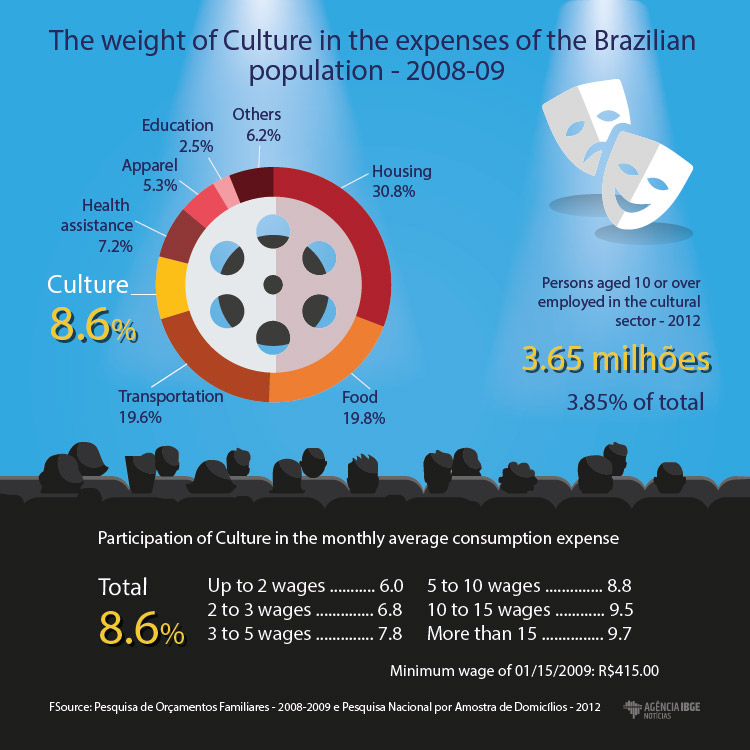
But lack of access to leisure and culture in general is only part of the constraint to which these populations are subjected. "[They are also constrained in their rights to] Integrity, health, education. People cannot go to school, sometimes they cannot have access to health, to the right to leisure ... And there is a strong impact on the economic activity," said Cano.
"It's something that has a systemic impact on all rights. Domestic violence has an impact on gender equality, for example. It's hard to find an area where it does not. "
One of the public policies identified as a solution for the problem of violence, education is directly threatened by insecurity. "There is no such a thing as a calm shilft to study, it starts with the limited time in schools. We have only one high school running all day long and one night college to serve 140,000 people. You no longer give the right to education. We ended up having to send our kids to other neighborhoods. We have mothers with children in schools in other communities, having to overcome these invisible barriers every day," said Flávia, the mother of a 17-year-old teenager who wakes up at 5 o'clock to study in Copacabana and escape the precariousness caused by violence.
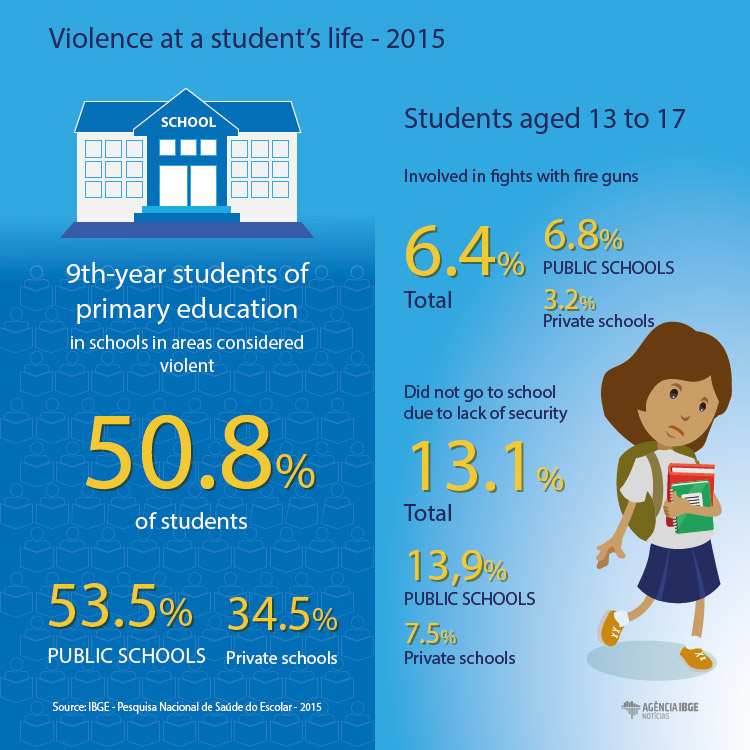
Sense of insecurity up among urban population
In 2009, the IBGE published the supplement of the National Household Sample Survey on victimization and access to justice in Brazil with data for that year. In addition to information on the existence of home security devices, the publication showed that 47.2% of the population aged 10 or older felt insecure in their hometown, a figure which rose to 50.3% in urban areas.
"More than half of the urban population declared feeling insecure, while that number was 30.7% in the rural areas. There was also a difference in the sense of security among the regions of Brazil, with the North having the greatest sense of insecurity (51.8%). The number also reduces as the person moves away from home, for usually one feels more secure firstly at home (78.6%), then in the neighborhood (67.1%), and finally in their hometown (52.8%)," explained IBGE's Labor and Income Coordinator, Cimar Azeredo.
"Besides, the higher the income level, the greater the security at home, but the lower in the neighborhood and the hometown. The difference in the sense of safety in these three spheres was fundamental in this case. The survey also shows that women feel less confident in general compared to men," added Cimar.
With the crime increase and the 59,103 malicious homicides in 2017, according to Violence Monitor, there is a tendency to increase the sense of insecurity, which is increasingly widespread in big cities, such as Rio de Janeiro.
"The point is: if someone thought they could protect a few groups and leave others vulnerable, history has proved it impossible, even though violence affects some groups more intensely. We must find a solution for everyone," said Cano.
